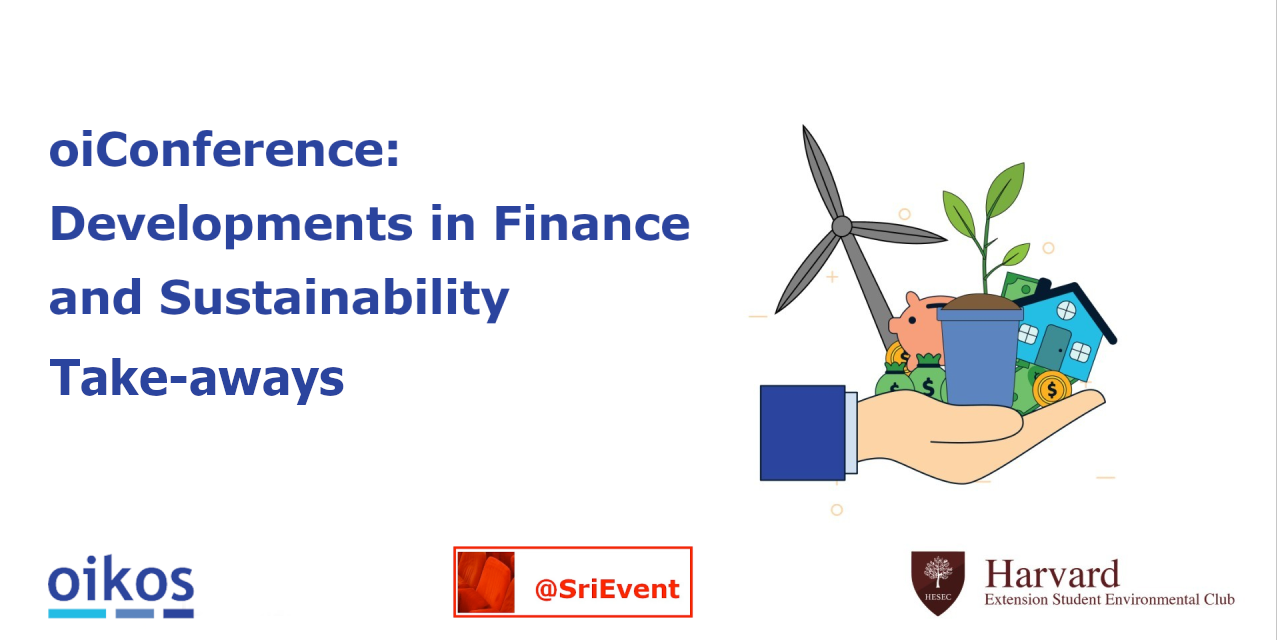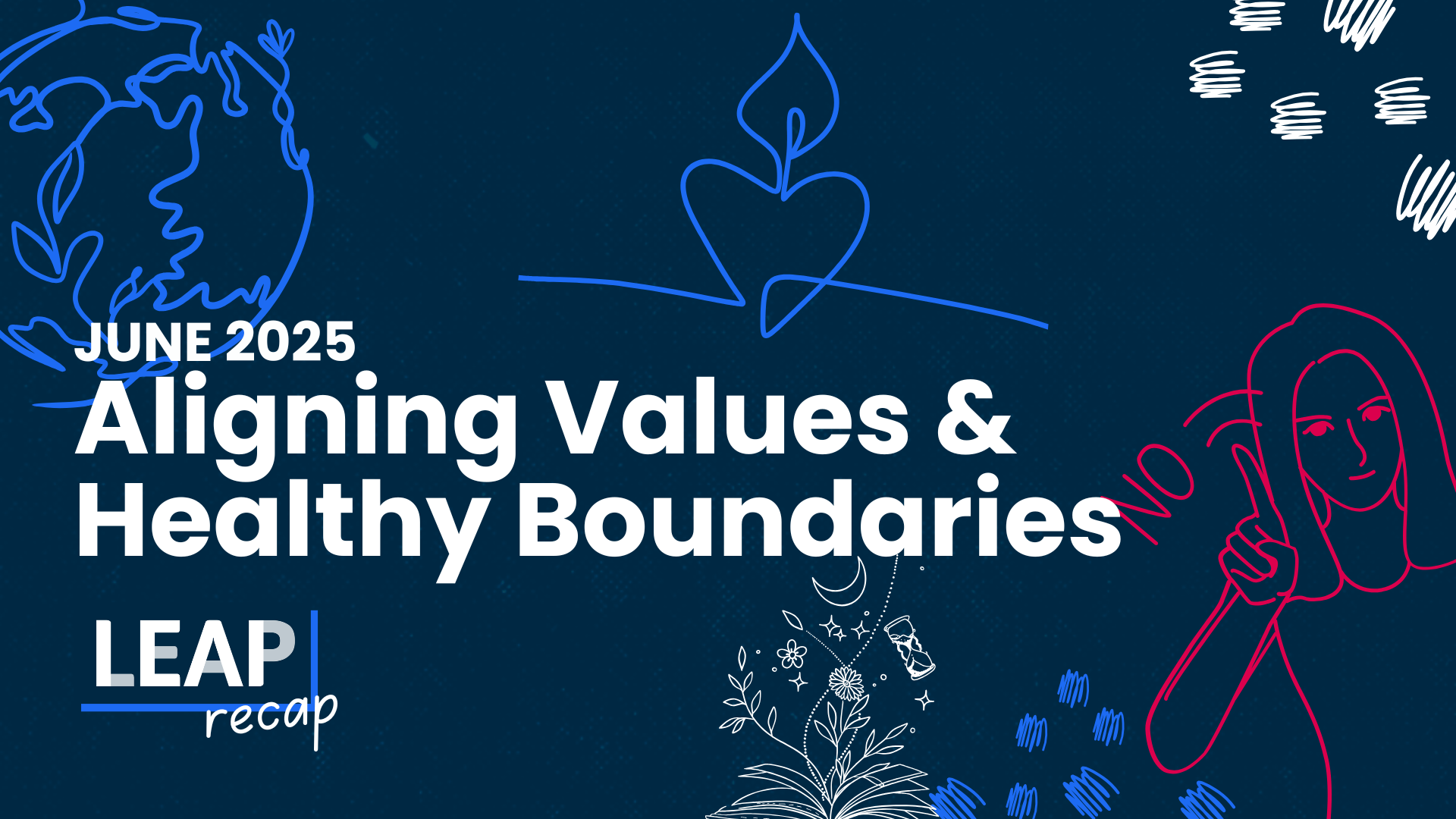
Author: Oliver Braunschweig
PhD Researcher, The New School, New York | Advisor to oikos NYC, Students for Sustainability in Economics and Management
The oiConference – Developments in Finance and Sustainability on April 3rd & 4th 2020 was a big success, and the recordings of the sessions are now available on oikos International’s YouTube page! The webinar brought together participants from all over the world, engaging professionals, academics, activists, and students in various discussions about developments in the financial world related to sustainability. This article will try to make some connections between the oiConference and the current times we are living in, and it will give some insights into the running of the conference itself. If you are interested in more details about the individual panels, you can find concise descriptions of each session underneath its YouTube video.

Background to the oiConference
We are writing this blog post in the middle of the Covid-19 pandemic, as worldwide, many of us are under some form of physical distancing regime. We are both well, and we know how lucky we are compared to the hardships many other people are experiencing. It turns out that the same patterns in our world which animated our original interest in sustainable development, arise also in the current crisis.
In some areas of the world, to be sure, the disease has not (or not yet) hit, so not everyone has to practice physical distancing. But in the harder hit areas not everyone can practice physical distancing: medical professionals, workers in essential infrastructure, and those who have to continue working to avert financial ruin. The disease itself highlights our dependence on essentials like social contact, nourishment, and health. But the disease also highlights our interdependence, by showing that our material and physical well-being is also dependent on the well-being of our neighbors and of people in far away places.
Yet just because many of us are noticing our interdependence more than before, it does not mean that everyone is hit equally be the disease. In fact, both the health situation and the economic fallout highlight the immense inequalities built into our economic system. Patterns of economic, social, and environmental injustice are being reinforced, and those with the least ability to advance in society are –generally — also the more precariously affected by the disease. What we may notice now is that an economy is only as resilient as its most vulnerable members: Large household debt translates to a higher risk of liquidity crises, environmental injustice increase vulnerabilities, and concentration of political power mean that crises are not dealt with early enough.
Many governments have responded with isolationist responses to the pandemic and they have reduced their international cooperation (just at the beginning of the Decade of Action!). Yet the fundamental inequities and precarities which this pandemic brings to light, actually demand even more of a focus on the Sustainable Development Goals (SDGs). The interdependence which we now see, should help us become more aware that doubling down on our commitments to better everyone’s life and to decrease environmental destruction, are actually the best way forward now.
Developments in Sustainable Finance
One of the ways in which the SDGs can be reached is by changing the finance industry. And we wanted the webinar as a whole to bring to the fore the possibilities and challenges in the sustainable finance industry. So with this being the case, we debated whether we wanted to ask our panelists to focus also on Covid-19. But we decided that we would let the speakers determine for themselves what they wanted to focus on since it was probably too early for anyone to speak on how this pandemic will change the world and this industry specifically. In the end, as we had initially intended, the speakers focused on how the financial system should be changed and, indeed, is already being changed by them and other actors.
The webinar showed that increasing numbers of financial companies are offering avenues for sustainable investment. This trends allows investors and companies to better align their financial and commercial interests with the SDGs. This trend, in turn, demonstrates to the finance industry and the larger economy that change is possible. Indeed, some of our panelists are working on creating the institutional links and data assessments necessary for larger finance to move in this direction as well.

So while there are clear signs that the industry can change, activists are saying that we must. And several of our panelists made a clear case for why it is important that big industry actors make changes to their investment strategies and portfolios. Overall, the demand is that our generation, which is richer than any generation before us, must also make sure that this richness benefits all. This wealth should bring increasing civil liberties for everyone while reducing ecological destruction and stopping climate change. In other words, there is an uplifting story to be told here: we can internalize externalities, and we do not just have to accept them as part of the game. Change is possible, and it is already happening.
We are inviting you to watch the recordings of the sessions you find most pertinent. And if you are interested in shorter takeaways, our moderators have written a few paragraphs about each session. You can find these shorter paragraphs in the descriptions of the YouTube videos.
We hope that you will enjoy them! (Click on the picture above to access the playlist on YouTube. For your ease, individual videos can also be found at the bottom of this article.)
#oikosWorld #SustainableFinance #MyMoneyMyPlanet
Running the Seminar
Each of the seven online panel sessions had between 60 and 130 participants. We ended both webinar days with a virtual networking session, which brought together another 40 participants and presenters for further discussion. For a free online event like ours, one can expect around 15-20% of total sign-ups to show up. So the roughly 500 sign-ups should have translated to about 75 to 100 participants, which we met and even exceeded. During the two days of the webinar, the audience submitted over 100 questions during Q&A. For the second time now, we used the free version of sli.do so that participants could actively bring in their questions and vote up their favorite questions. This platform allowed us to effectively source questions in the background of the presentations, while the moderators of each session were free to focus on their interaction with the panelists. So when it came to asking questions, we had already sourced the most pertinent questions from the community for the panelists. This active participation far exceeded our expectations and we are glad that so many people joined us!
Next Steps
Our aim is to continue putting together events like this one to foster connections and enable learning about sustainability in finance and economics. If you would like to join us in this endeavor, please reach out to us!
We are also interested in supporting campaigns with a similar focus. One of these campaigns that we hope you will support is #MyMoneyMyPlanet. (Take a selfie with your bankcard while hiding the credit card number with your finger. Then post the selfie and tag your bank, asking them to invest your money sustainably.)
Thanks!
To our sponsors, the Harvard Extension Student Environmental Club (HESEC), oikos International, and SRI Events, a heartfelt thank you for your support in spreading the message about our event and supporting us also in the lead-up to the event itself! And we are also very appreciative of the time and dedication our speakers and moderators gave to participate in this project. Thank you! (And we are also appreciative of you all for having spread the message about your panels in tweets and LinkedIn posts before the oiConference itself!)
Participants joined from all over the world, reflecting the networks of our sponsors and panelists. While the majority of participants joined from the United States and Europe, we also had many join in from countries like Australia, Brazil, India, Malaysia, or Peru, to name just a few. About half of the participants identified themselves as students while the others worked in both the private, public, or non-profit sectors. We’re delighted to see that our second such oiConference has again brought together such a diverse set of participants with their perspectives and questions.
You can find more information on each moderator and speaker in this document.
With a global pandemic forcing many of us inside, we were glad that our virtual conference was able to be a place of learning and connecting safely while also minimizing the environmental impact caused by travel. We have already started planning our next oiConference to continue our exploration of the topic of Sustainability in Finance. If you would like to participate and help organize feel free to reach out to us.
Thank you to all the panelists, moderators, and participants!
The oiConference Planning Team

Stephen Snider
Stephen was born and raised in Jamaica and moved to the US for college to study Economics and Statistics. He then moved to Boston to work in corporate banking and loves his second home. In summer of 2018, he quit his job to start an MA at Harvard in Development Practices. He believes that sustainable finance can drive real change and make the world a better place. Connect with him on Instagram as he shares what he is learning.

Oliver Braunschweig
Oliver is a PhD Student in Economics at The New School in New York, focusing on the intersection of ecological economics, economic history, and money & banking. While studying there, he also co-founded oikos NYC. Originally from Switzerland, he graduated from the University of Basel with a BA in Social Sciences and Economics where he was also active in organizing and facilitating Muslim-Jewish dialogue. He currently lives in Boston with his spouse, Rabbi Elli Cohn.
Rewatch the oiConference!
Did you attend the oiConference and want go back and rewatch a certain point or you simply missed it and would like to take a look into the sessions to catch up? Either way you’re welcome to watch the sessions on the oikos International Youtube channel.



